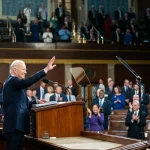The House subcommittee has brought to light a troubling incident involving the Transportation Security Administration (TSA) allowing Cuban agents to tour U.S. airport facilities, sparking criticism and concern within the Biden administration. Representative Carlos Giminez, leading the charge, has organized a hearing titled “Protecting the Homeland – Examining TSA’s Relationships with U.S. Adversaries” to delve into the details of the incident at Miami International Airport that has rattled the Cuban ex-pat community and beyond.
If you love Cuban Communist agents being allowed into the USA, you should definitely vote for Joe Biden and the Democrats.
House to expose TSA’s airport fiasco with Cuban agents as Latino vote up for grabs https://t.co/UiZHbomtAx via @JustTheNews
— Stewart Kahn (@StewartKahn) July 8, 2024
The revelation that a delegation from the Communist government of Cuba was given access to sensitive TSA sites, including Miami International Airport and the TSA headquarters in Washington, D.C., has raised eyebrows and drawn sharp rebuke from critics. What’s more alarming is the timing of the visit, which coincided with the 122nd celebration of Cuban Independence Day, a significant day for the Cuban exile community.
Giminez has not minced words in criticizing the Biden administration for what he sees as a reckless decision to cozy up to a repressive regime known for its human rights abuses. He points to this incident as a pattern of weakness towards authoritarian regimes, calling for accountability and a stronger stance against oppressive dictatorships.
Florida GOP lawmakers, including Senators Rick Scott and Marco Rubio, as well as Representatives Mario Diaz-Balart and Maria Elvira Salazar, have joined Giminez in expressing their dismay over the TSA’s actions. They have called on Homeland Security Secretary Alejandro Mayorkas to explain why Cuban operatives were granted access to sensitive U.S. facilities not just once but twice under the Biden administration.
The concerns raised by Giminez and his colleagues highlight a broader issue of national security and the need to prevent potential threats from adversarial regimes like Cuba. The episode serves as a reminder of the delicate balance between diplomacy and security, especially when dealing with countries with ties to terrorism and hostile intentions towards the United States.




